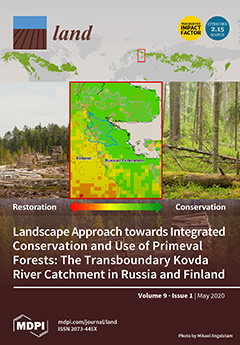Resources
Displaying 1446 - 1450 of 2258Landslide Mapping and Susceptibility Assessment Using Geospatial Analysis and Earth Observation Data
The western part of Crete Island has undergone serious landslide events in the past. The intense rainfalls that took place in the September 2018 to February 2019 period provoked extensive landslide events at the northern part of Chania prefecture, along the motorway A90. Geospatial analysis methods and earth observation data were utilized to investigate the impact of the various physical and anthropogenic factors on landslides and to evaluate landslide susceptibility. The landslide inventory map was created based on literature, aerial photo analysis, satellite images, and field surveys.
From City- to Site-Dimension: Assessing the Urban Ecosystem Services of Different Types of Green Infrastructure
Cities have a wide variety of green infrastructure types, such as parks and gardens. These structures can provide important ecosystem services (ES) with a major impact on human well-being. With respect to urban planning, special consideration must be given to such green infrastructure types when implementing measures to maintain and enhance the quality of life. Therefore, generating knowledge on the urban ES of differently scaled green infrastructure types is important.
The Incremental Demise of Urban Green Spaces
More precise explanations are needed to better understand why public green spaces are diminishing in cities, leading to the loss of ecosystem services that humans receive from natural systems. This paper is devoted to the incremental change of green spaces—a fate that is largely undetectable by urban residents. The paper elucidates a set of drivers resulting in the subtle loss of urban green spaces and elaborates on the consequences of this for resilience planning of ecosystem services.
Smart Villages: Where Can They Happen?
The European Union is actively promoting the idea of “smart villages”. The increased uptake of new technology and in particular, the use of the internet, is seen as a vital part of strategies to combat rural decline. It is evident that those areas most poorly connected to the internet are those confronted by the greatest decline. The analysis in this paper is based on Poland, which at the time of EU accession had many deeply disadvantaged rural areas. Using fine-grained socio-economic data, an association can be found between weak internet access and rural decline in Poland.
Spatial Planning, Urban Governance and the Economic Context: The Case of ‘Mehr’ Housing Plan, Iran
With the increasing concentration of population and economic activities in metropolitan regions, dwelling shortages and housing quality have become critical issues in urban management. Town plans considering social, economic, political, and cultural features of local communities have been developed with the aim of supporting housing, especially in emerging economies. In Iran, the ‘Mehr Housing’ Plan has been considered as one of the most relevant strategies for social housing since the 2000s.


